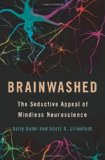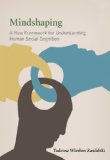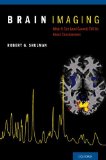May 20, 2013

Brainwashed: The Seductive Appeal of Mindless Neuroscience by Sally Satel and Scott O. Lilienfeld (Basic Books, 2013)
(kindle ed.), (amazon.co.uk)
Book description from the publisher:
What can’t neuroscience tell us about ourselves? Since fMRI—functional magnetic resonance imaging—was introduced in the early 1990s, brain scans have been used to help politicians understand and manipulate voters, determine guilt in court cases, and make sense of everything from musical aptitude to romantic love. But although brain scans and other neurotechnologies have provided groundbreaking insights into the workings of the human brain, the increasingly fashionable idea that they are the most important means of answering the enduring mysteries of psychology is misguided—and potentially dangerous.
In Brainwashed, psychiatrist and AEI scholar Sally Satel and psychologist Scott O. Lilienfeld reveal how many of the real-world applications of human neuroscience gloss over its limitations and intricacies, at times obscuring—rather than clarifying—the myriad factors that shape our behavior and identities. Brain scans, Satel and Lilienfeld show, are useful but often ambiguous representations of a highly complex system. Each region of the brain participates in a host of experiences and interacts with other regions, so seeing one area light up on an fMRI in response to a stimulus doesn’t automatically indicate a particular sensation or capture the higher cognitive functions that come from those interactions. The narrow focus on the brain’s physical processes also assumes that our subjective experiences can be explained away by biology alone. As Satel and Lilienfeld explain, this “neurocentric” view of the mind risks undermining our most deeply held ideas about selfhood, free will, and personal responsibility, putting us at risk of making harmful mistakes, whether in the courtroom, interrogation room, or addiction treatment clinic.
A provocative account of our obsession with neuroscience, Brainwashed brilliantly illuminates what contemporary neuroscience and brain imaging can and cannot tell us about ourselves, providing a much-needed reminder about the many factors that make us who we are.
Comments (0)
- cognitive science,new books
May 17, 2013

The Art of Thinking Clearly by Rolf Dobelli (Harper, 2013)
(kindle ed.), (amazon.co.uk)
Book description from the publisher:
The Art of Thinking Clearly by world-class thinker and entrepreneur Rolf Dobelli is an eye-opening look at human psychology and reasoning — essential reading for anyone who wants to avoid “cognitive errors” and make better choices in all aspects of their lives.
Have you ever: Invested time in something that, with hindsight, just wasn’t worth it? Or continued doing something you knew was bad for you? These are examples of cognitive biases, simple errors we all make in our day-to-day thinking. But by knowing what they are and how to spot them, we can avoid them and make better decisions.
Simple, clear, and always surprising, this indispensable book will change the way you think and transform your decision-making—work, at home, every day. It reveals, in 99 short chapters, the most common errors of judgment, and how to avoid them.
See also: Author’s website
Comments (0)
- cognitive science,new books,psychology
May 14, 2013

Permanent Present Tense: The Unforgettable Life of the Amnesic Patient, H. M. by Suzanne Corkin (Basic Books, 2013)
(kindle ed.), (amazon.co.uk)
Book description from the publisher:
In 1953, 27-year-old Henry Gustave Molaison underwent an experimental “psychosurgical” procedure—a targeted lobotomy—in an effort to alleviate his debilitating epilepsy. The outcome was unexpected—when Henry awoke, he could no longer form new memories, and for the rest of his life would be trapped in the moment.
But Henry’s tragedy would prove a gift to humanity. As renowned neuroscientist Suzanne Corkin explains in Permanent Present Tense, she and her colleagues brought to light the sharp contrast between Henry’s crippling memory impairment and his preserved intellect. This new insight that the capacity for remembering is housed in a specific brain area revolutionized the science of memory. The case of Henry—known only by his initials H. M. until his death in 2008—stands as one of the most consequential and widely referenced in the spiraling field of neuroscience. Corkin and her collaborators worked closely with Henry for nearly fifty years, and in Permanent Present Tense she tells the incredible story of the life and legacy of this intelligent, quiet, and remarkably good-humored man. Henry never remembered Corkin from one meeting to the next and had only a dim conception of the importance of the work they were doing together, yet he was consistently happy to see her and always willing to participate in her research. His case afforded untold advances in the study of memory, including the discovery that even profound amnesia spares some kinds of learning, and that different memory processes are localized to separate circuits in the human brain. Henry taught us that learning can occur without conscious awareness, that short-term and long-term memory are distinct capacities, and that the effects of aging-related disease are detectable in an already damaged brain.
Undergirded by rich details about the functions of the human brain, Permanent Present Tense pulls back the curtain on the man whose misfortune propelled a half-century of exciting research. With great clarity, sensitivity, and grace, Corkin brings readers to the cutting edge of neuroscience in this deeply felt elegy for her patient and friend.
See also: Book website
Comments (0)
- cognitive science,new books
May 11, 2013

Mindshaping: A New Framework for Understanding Human Social Cognition by Tadeusz Wieslaw Zawidzki (MIT Press/Bradford Books, 2013)
(amazon.co.uk)
Book description from the publisher:
In this novel account of distinctively human social cognition, Tadeusz Zawidzki argues that the key distinction between human and nonhuman social cognition consists in our complex, diverse, and flexible capacities to shape each other’s minds in ways that make them easier to interpret. Zawidzki proposes that such “mindshaping” — which takes the form of capacities and practices such as sophisticated imitation, pedagogy, conformity to norms, and narrative self-constitution — is the most important component of human social cognition. Without it, he argues, none of the other components of what he terms the “human sociocognitive syndrome,” including sophisticated language, cooperation, and sophisticated “mindreading,” would be possible.
Challenging the dominant view that sophisticated mindreading — especially propositional attitude attribution — is the key evolutionary innovation behind distinctively human social cognition, Zawidzki contends that the capacity to attribute such mental states depends on the evolution of mindshaping practices. Propositional attitude attribution, he argues, is likely to be unreliable unless most of us are shaped to have similar kinds of propositional attitudes in similar circumstances. Motivations to mindshape, selected to make sophisticated cooperation possible, combine with low-level mindreading abilities that we share with nonhuman species to make it easier for humans to interpret and anticipate each other’s behavior. Eventually, this led, in human prehistory, to the capacity to attribute full-blown propositional attitudes accurately — a capacity that is parasitic, in phylogeny and today, on prior capacities to shape minds. Bringing together findings from developmental psychology, comparative psychology, evolutionary psychology, and philosophy of psychology, Zawidzki offers a strikingly original framework for understanding human social cognition.
Comments (0)
- cognitive science,culture,new books,philosophy of mind,psychology
May 8, 2013

Brain Imaging: What it Can (and Cannot) Tell Us About Consciousness by Robert G. Shulman (Oxford University Press, USA, 2013)
(amazon.co.uk)
Book description from the publisher:
Magnetic resonance imaging methods have taken a commanding position in brain studies because they allow scientists to follow brain activities in the living human. The ability to measure cerebral anatomy, neuronal firing, and brain metabolism has extended and re-invigorated hopes of understanding the role that brain activity plays in human life. The brain has assumed a central role in our thinking of the world that can be traced back to the philosophies that are expressed in psychology, religion, literature, and everyday life. Brain scientists, planning and measuring brain activities by imaging methods, have consciously or unconsciously been influenced by these philosophical views.
Brain Imaging: What It Can (and Cannot) Tell Us About Consciousness, in describing the experiments using imaging methods, traces how assumptions about the nature of brain function made in planning scientific experiments are the consequences of philosophical positions. Experiments that relate brain activities to observable behavior are shown to avoid the philosophical and psychological assumptions about mental processes that have been proposed to underlie these behaviors. This analysis establishes the conditions necessary for reproducible brain responses.
Comments (0)
- cognitive science,consciousness,new books







